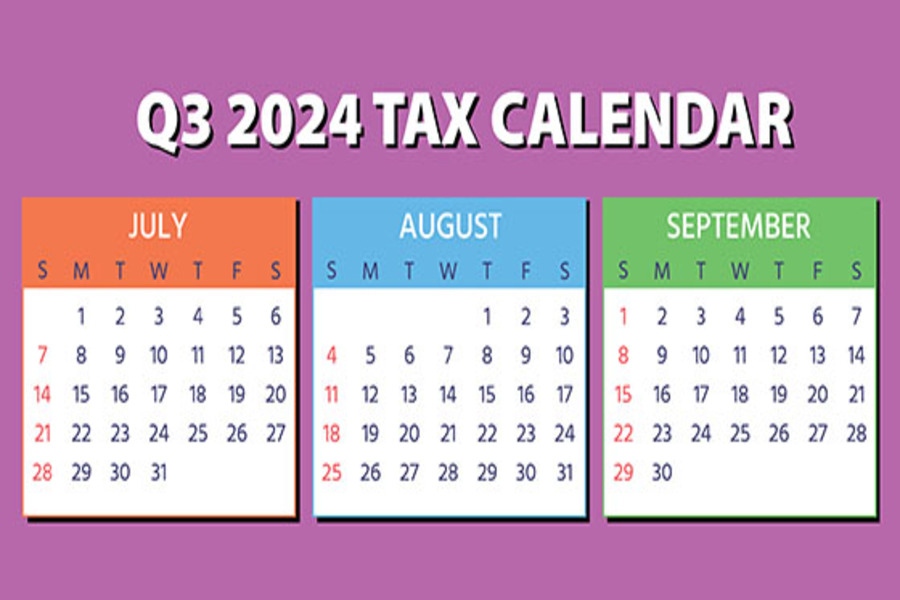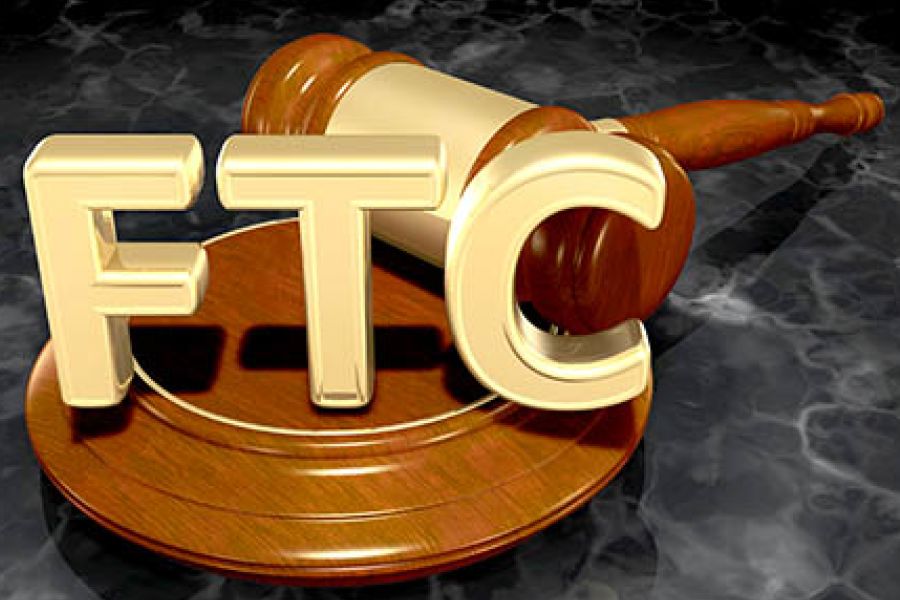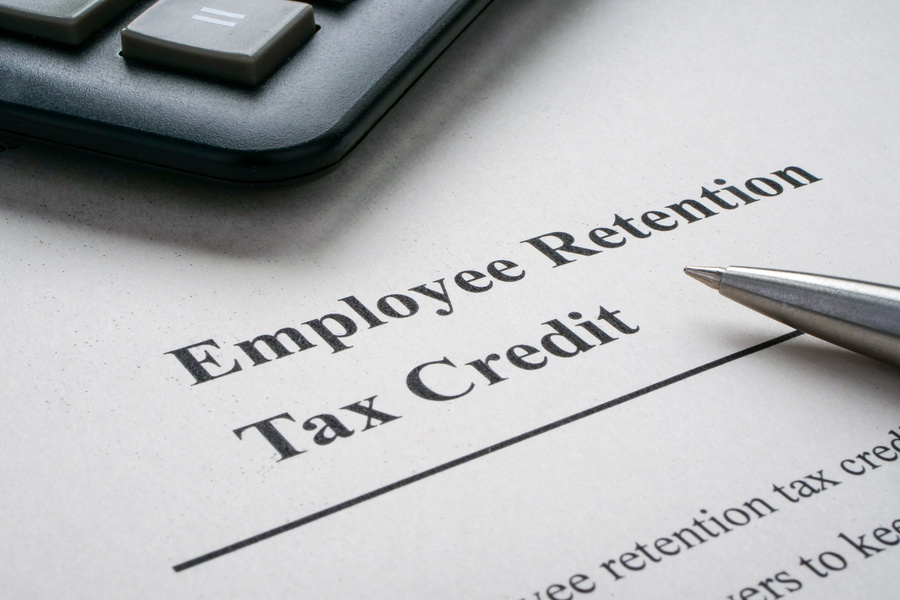July 15 Employers should deposit Social Security, Medicare and withheld income taxes for June if the monthly deposit rule applies. They should also deposit non-payroll withheld income tax for June if the monthly deposit rule applies. July 31 Report income tax withholding and FICA taxes for second quarter 2024 (Form 941) and pay any tax due. (See the exception below, under “August 12.”) File a 2023 calendar-year retirement plan report (Form 5500 or Form 5500-EZ) or request an extension. August 12 Report income tax withholding and FICA taxes for second quarter 2024 (Form 941), if you deposited on time and in full all the associated taxes due. September 16 If a calendar-year C corporation, pay the third installment of 2024 estimated income taxes. If a calendar-year S corporation or partnership that...

Employees, self-employed individuals and employers all pay Social Security tax, and the amounts can get bigger every year. And yet, many people don’t fully understand the Social Security tax they pay. If you’re an employee If you’re an employee, your wages are hit with the 12.4% Social Security tax up to the annual wage ceiling. Half of the Social Security tax bill (6.2%) is withheld from your paychecks. The other half (also 6.2%) is paid by your employer, so you never actually see it. Unless you understand how the Social Security tax works and closely examine your pay statements, you may be blissfully unaware of the size of the tax. It’s potentially a lot! The Social Security tax wage ceiling for 2024 is $168,600 (up from $160,200 for...
With school out, you might be hiring your child to work at your company. In addition to giving your son or daughter some business knowledge, you and your child could reap some tax advantages. Benefits for your child There are special tax breaks for hiring your offspring if you operate your business as one of the following: A sole proprietorship, A partnership owned by both spouses, A single-member LLC that’s treated as a sole proprietorship for tax purposes, or An LLC that’s treated as a partnership owned by both spouses. These entities can hire an owner’s under-age-18 children as full- or part-time employees. The children’s wages then will be exempt from the following federal payroll taxes: Social Security tax, Medicare tax, and Federal unemployment (FUTA) tax (until an...
For many businesses, such as retailers, manufacturers and contractors, strict inventory control is central to operations. If you don’t track inventory accurately, you can’t effectively produce goods, meet customer demand and realize profits. Let’s say you’re performing a year-end inventory count and you come up short. Have you miscounted or have the items been misplaced? Or has someone stolen inventory? A professional fraud expert can help you get to the bottom of such discrepancies. Assuming an innocent explanation Before assuming theft, experts investigate whether missing inventory items were really stolen. Employees might have kept sloppy records or failed to follow proper procedures, resulting in “missing” inventory. For example, a company without a location assignment for each item, an effective method of tracking overflow stock, and a well-run returns...
Do you invest in mutual funds or are you interested in putting some money into them? If so, you’re part of a large group. According to the Investment Company Institute, 116 million individual U.S. investors owned mutual funds in 2023. But despite their widespread use, the tax rules involved in selling mutual fund shares can be complex. Review the basic rules Let’s say you sell appreciated mutual fund shares that you’ve owned for more than one year. The resulting profit will be a long-term capital gain. As such, the maximum federal income tax rate will be 20%, and you may also owe the 3.8% net investment income tax. However, most taxpayers will pay a tax rate of only 15% and some may even qualify for a 0%...
The next quarterly estimated tax payment deadline is September 16 for individuals and businesses, so it’s a good time to review the rules for computing corporate federal estimated payments. You want your business to pay the minimum amount of estimated tax without triggering the penalty for underpayment of estimated tax. Four possible options The required installment of estimated tax that a corporation must pay to avoid a penalty is the lowest amount determined under one of the following four methods: Current year method. Under this option, a corporation can avoid the estimated tax underpayment penalty by paying 25% of the tax shown on the current tax year’s return (or, if no return is filed, 25% of the tax for the current year) by each of four installment...
Noncompete agreements can be valuable to a business, especially after a merger or acquisition. Estimating the value of these agreements has become more complicated in light of a controversial new final rule issued by the Federal Trade Commission (FTC) that will ban noncompetes for most employees and independent contractors, starting in September 2024. Types of noncompetes Noncompete agreements have been a standard business practice for decades. Some are required as a condition of employment or upon termination of employment. Here, the employer requires an employee to sign a noncompete agreement to protect the employer’s business interests, guard against disclosure of trade secrets, and prevent the employee from poaching customers or clients. These agreements generally limit employment activities in the same field for a specified period. Noncompetes also may...
Are you an older taxpayer who owns a house that has appreciated greatly? At the same time, you may need income. Thankfully, there could be a solution with a tax-saving bonus. It involves taking out a reverse mortgage. Reverse mortgage basics With a reverse mortgage, the borrower doesn’t make payments to the lender to pay down the mortgage principal over time. Instead, the reverse happens. The lender makes payments to you and the mortgage principal gets bigger over time. Interest accrues on the reverse mortgage and is added to the loan balance. But you typically don’t have to repay anything until you permanently move out of the home or pass away. You can receive reverse mortgage proceeds as a lump sum, in installments over a period of time...
As reported in IR-2024-169 IRS enters next stage of Employee Retention Tax Credit work; review indicates vast majority show risk of being improper Highest-risk claims being denied, additional processing to begin on low-risk claims; heightened scrutiny and review continues as compliance work tops $2 billion; IRS will consult with Congress on potential legislative action before making decision on future of moratorium Following a detailed review to protect taxpayers and small businesses, the Internal Revenue Service on June 20, 2024 announced plans to deny tens of thousands of improper high-risk Employee Retention Tax Credit claims while starting a new round of processing lower-risk claims to help eligible taxpayers. “The completion of this review provided the IRS with new insight into risky Employee Retention Tax Credit activity and confirmed widespread concerns...
One of the types of occupational fraud schemes that became more costly for employers since the beginning of the COVID-19 pandemic in 2020 is expense reimbursement fraud. According to the Association of Certified Fraud Examiners’ (ACFE’s) latest report, this type of employee scheme now ranks fourth after corruption, billing schemes and noncash fraud. Although the $50,000 median loss of expense reimbursement scams is less than that of some other frauds, it’s also very commonly perpetrated. According to software company Emburse, nearly 25% of 1,000 workers surveyed admitted to passing off personal purchases as work-related buys. If you let internal controls slip a bit during the pandemic and you’re seeing more exaggerated or falsified expense reports, it’s time to reinforce your fraud deterrents. How they do it Employees often...
- 1
- 2
- 3
- 4
- 5
- 6
- 7
- 8
- 9
- 10
- 11
- 12
- 13
- 14
- 15
- 16
- 17
- 18
- 19
- 20
- 21
- 22
- 23
- 24
- 25
- 26
- 27
- 28
- 29
- 30
- 31
- 32
- 33
- 34
- 35
- 36
- 37
- 38
- 39
- 40
- 41
- 42
- 43
- 44
- 45
- 46
- 47
- 48
- 49
- 50
- 51
- 52
- 53
- 54
- 55
- 56
- 57
- 58
- 59
- 60
- 61
- 62
- 63
- 64
- 65
- 66
- 67
- 68
- 69
- 70
- 71
- 72
- 73
- 74
- 75
- 76
- 77
- 78
- 79
- 80
- 81
- 82
- 83
- 84
- 85
- 86
- 87
- 88
- 89
- 90
- 91
- 92
- 93
- 94
- 95
- 96
- 97
- 98
- 99
- 100
- 101
- 102
- 103
- 104
- 105
- 106
- 107
- 108
- 109
- 110
- 111
- 112
- 113
- 114
- 115
- 116
- 117
- 118
- 119
- 120
- 121
- 122
- 123
- 124
- 125
- 126
- 127
- 128
- 129
- 130
- 131
- 132
- 133
- 134
- 135
- 136
- 137
- 138
- 139
- 140
- 141
- 142
- 143
- 144
- 145
- 146
- 147
- 148
- 149
- 150











